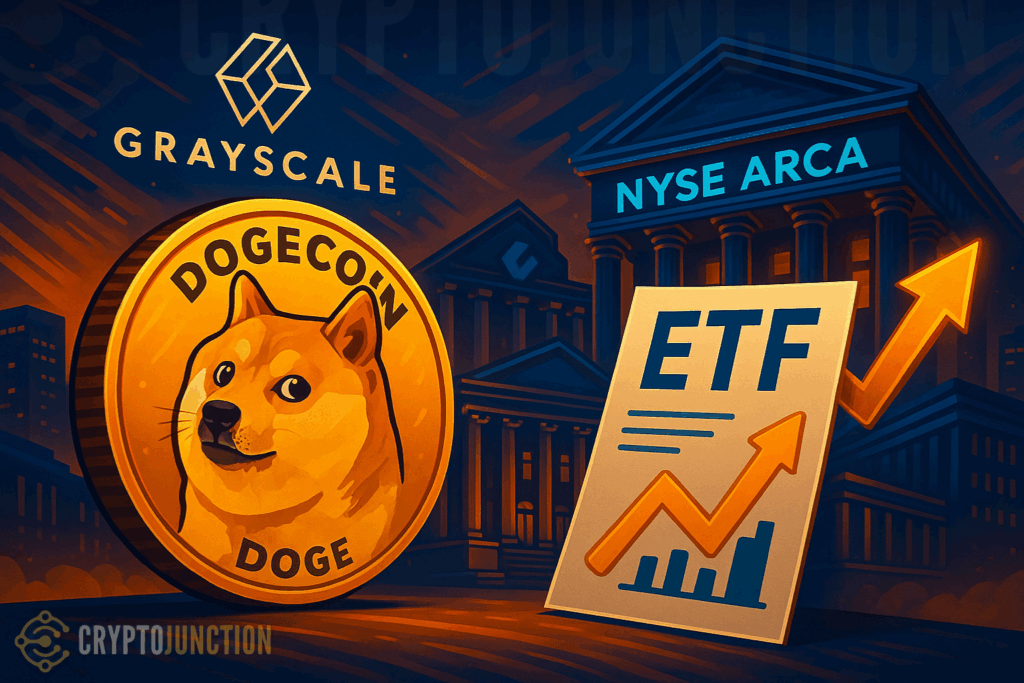Who would have thought that the cryptocurrency world’s biggest joke could become Wall Street’s next big play? Dogecoin—yes, the meme coin born from an internet dog meme—is now at the center of a serious financial transformation. In a move that has left both skeptics and enthusiasts wide-eyed, Grayscale has filed an amended S-1 form with the U.S. Securities and Exchange Commission (SEC). This signals its intent to convert its closed-end Dogecoin Trust into a full-fledged exchange-traded fund. This move could potentially make the Grayscale Dogecoin ETF a reality soon.
The timing is dramatic. Just days ago, the SEC approved new standards to streamline crypto fund listings. Many experts say this decision could unleash a flood of digital asset ETFs in the coming months. Against this backdrop, Grayscale’s pivot looks less like a quirky experiment and more like a strategic masterstroke. Investors are left asking: Could a meme coin really compete with Bitcoin and Ethereum in the world of regulated financial products?
Inside The Filing: Coinbase, Ethereum, And A Race For Approval
According to the updated filing, Grayscale plans to partner with Coinbase as both prime broker and custodian for the proposed Dogecoin ETF. This ETF would trade under the ticker GDOG on NYSE Arca pending approval. Notably, NYSE Arca had already filed to trade the Grayscale Dogecoin Trust. However, this new move upgrades the ambition along the lines of a grayscale Dogecoin ETF.
And that’s not all. On the very same day, NYSE Arca submitted a proposal to amend both the Grayscale Ethereum Trust and its “mini” version. They are aligning them with the SEC’s newly approved generic listing standards. This is a crucial detail: the new framework reduces oversight hurdles. It potentially speeds up approvals and lowers the bar for more crypto ETFs to enter the market.
The SEC’s updated listing rules require that a digital asset must have a futures market on a regulated exchange for at least six months. Grayscale pointed out that Dogecoin futures and options already exist on Commodity Futures Trading Commission-regulated exchanges. In short, DOGE checks the boxes, paving the way for a grayscale ETF featuring Dogecoin.
If approved, GDOG wouldn’t just represent another ETF—it would symbolize meme culture breaking into the highest levels of institutional investing. With Coinbase backing custody operations, the proposal carries a layer of credibility. This might silence critics who still dismiss Dogecoin as a passing fad.
The Unexpected Twist: Not Just A Meme, But A Market Shake-Up
Here’s the kicker: Grayscale argues that GDOG should not be classified as a registered investment company under the Investment Company Act of 1940. Nor does it consider the trust a commodity pool subject to CFTC regulation. This positioning effectively sidesteps regulatory pitfalls that have bogged down other crypto products.
Even more surprising, Grayscale revealed no immediate plans to allow in-kind creations and redemptions for GDOG. This is despite the SEC’s recent openness to that structure. This choice raises questions: Is Grayscale playing a cautious game, or does it know something the market doesn’t?
Adding to the intrigue, the filing was signed by Grayscale’s top brass, including Chairman Barry Silbert and CFO Edward McGee, under the Securities Act of 1933. This framework has historically governed major securities launches. In other words, this isn’t a half-hearted attempt. It’s a deliberate, calculated move intended to establish the Grayscale Dogecoin ETF.
This latest twist comes on the heels of other seismic shifts in the ETF landscape. REX and Osprey just secured SEC approval for their own Dogecoin fund. Meanwhile, Grayscale recently launched a multi-asset index fund covering Bitcoin, Ethereum, Solana, XRP, and ADA. Combined with the SEC’s recent approvals for spot Bitcoin and Ethereum ETFs, the stage is set. A cascade of crypto products, including a grayscale Dogecoin ETF, could hit the mainstream.
So, what’s next? If history is any guide, this could be the moment when meme coins stop being laughed at and start being traded seriously on Wall Street. For investors, the surprise isn’t just that Dogecoin has come this far—it’s that the meme could actually outlive the joke.

